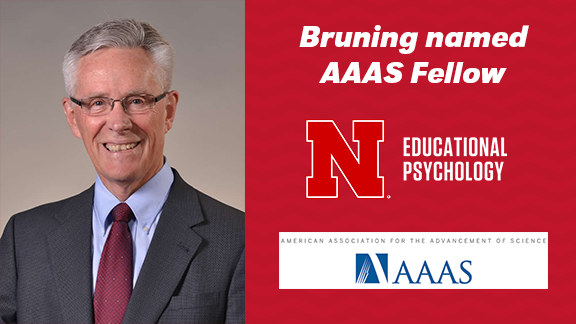
Bruning named prestigious AAAS Fellow
22 Nov 2017
Roger Bruning, Velma Warren Hodder professor of educational psychology, is one of four University of Nebraska–Lincoln professors announced today as fellows of the American Association for the Advancement of Science, the largest general scientific society in the world. Fellows are selected by their peers for scientifically or socially distinguished achievements that advance science or its application.
This continues the Nebraska faculty’s tradition of success in receiving this recognition, with five fellows named in 2016 and a record eight in 2015. The other three professors are David Hage, chemistry; Jim Lewis, mathematics; and Jay Storz, biological sciences.
Across a nearly 50-year career, educational psychologist Roger Bruning has focused his research on applying psychological principles to teaching and learning.
“Being raised as a ‘farm kid’ in Nebraska, I had many opportunities to explore the world around me,” he said. “This shaped my interest in education and learning issues.”
Bruning conducts research on how certain areas of students’ cognition and motivation–short- and long-term memory, self-efficacy and self-regulation, for example–affect their ability to read, write and learn. With this information, he devises instructional techniques that maximize learning, particularly in science.
Bruning, co-director of Nebraska’s Center for Instructional Innovation, has been part of multiple partnerships aimed at improving teaching in Nebraska and beyond.
For many years, he and colleagues have worked closely with local schools to develop science inquiry projects for rural and urban K-12 students. With support from the Andrew W. Mellon Foundation, he developed ThinkAboutIt and Infogather, online platforms that foster collaborative and efficient learning.
Bruning is especially proud of his contribution to widely used psychology texts that highlight cognitive and motivational processes in writing, mathematics and science learning.
“Being named an AAAS fellow is a direct result of my work with many talented colleagues in science, math and the cognitive sciences, and I see it as one of the most satisfying moments of my career,” he said.
For more details on the award and the other honorees, see the university’s news release.
College of Education and Human Sciences
Educational Psychology